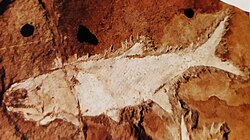Biology:Dicellopyge
| Dicellopyge | |
|---|---|

| |
| Dicellopyge draperi fossil | |
| Scientific classification | |
| Script error: No such module "Taxobox ranks".: | Animalia |
| Script error: No such module "Taxobox ranks".: | Chordata |
| Script error: No such module "Taxobox ranks".: | Actinopterygii |
| Script error: No such module "Taxobox ranks".: | †Palaeonisciformes |
| Script error: No such module "Taxobox ranks".: | †Palaeoniscidae |
| Script error: No such module "Taxobox ranks".: | †Dicellopyge Brough, 1931 |
| Type species | |
| Dicellopyge macrodentata Brough, 1931
| |
| Species | |
| |
| Synonyms | |
| |
Dicellopyge is an extinct genus of freshwater[1] ray-finned fish that lived during the Anisian age of the Middle Triassic epoch in what is now South Africa . It was originally named "Dicellopygae" by James Brough but the name was later corrected to Dicellopyge by Peter Hutchinson.[2]
Dicellopyge coexisted with fish such as Lissodus, Elonichthys, Ceratodus, Coelacanthus, Helichthys, Meidiichthys, and Atopocephala.[1]
Appearance
It is characterized , for example, by the short, blunt snout and a deeply cleft tail fin. Two species are known, D. draperi (=D. macrodentata) and D. lissocephalus, which were contemporaries and differed in scale and tail fin morphology.
Classification
It was initially classified in its own family, the Dicellopygidae,[2] but has subsequently been referred to the Palaeoniscidae[3] as a close relative of Acrolepis, Cornuboniscus, Belichthys, and the Amblypteridae.[4]
References
- ↑ 1.0 1.1 1.2 Fischer, Jan (2008). "Brief synopsis of the hybodont form taxon Lissodus BROUGH, 1935, with remarks on the environment and associated fauna". Freiberger Forschungshefte 528 (16): 1–23. https://www.researchgate.net/publication/248399734.
- ↑ 2.0 2.1 Hutchinson, Peter (1975). "Two Triassic fish from South Africa and Australia, with comments on the evolution of the Chondrostei". Palaeontology 18 (3): 613–629. https://www.palass.org/publications/palaeontology-journal/archive/18/3/article_pp613-629.
- ↑ Poplin, Cecile; Lund, Richard (1997). "Evolution of the premaxillary in the primitive fossil actinopterygians". Geodiversitas 19 (3): 557–565. http://sciencepress.mnhn.fr/sites/default/files/articles/pdf/g1997n3a3.pdf.
- ↑ Dietze, Kathrin (2000). "A Revision Of Paramblypterid And Amblypterid Actinopterygians From Upper Carboniferous–Lower Permian Lacustrine Deposits Of Central Europe". Palaeontology 43 (5): 927–966. doi:10.1111/1475-4983.00156. Bibcode: 2000Palgy..43..927D.
Wikidata ☰ Q1027262 entry
 |
